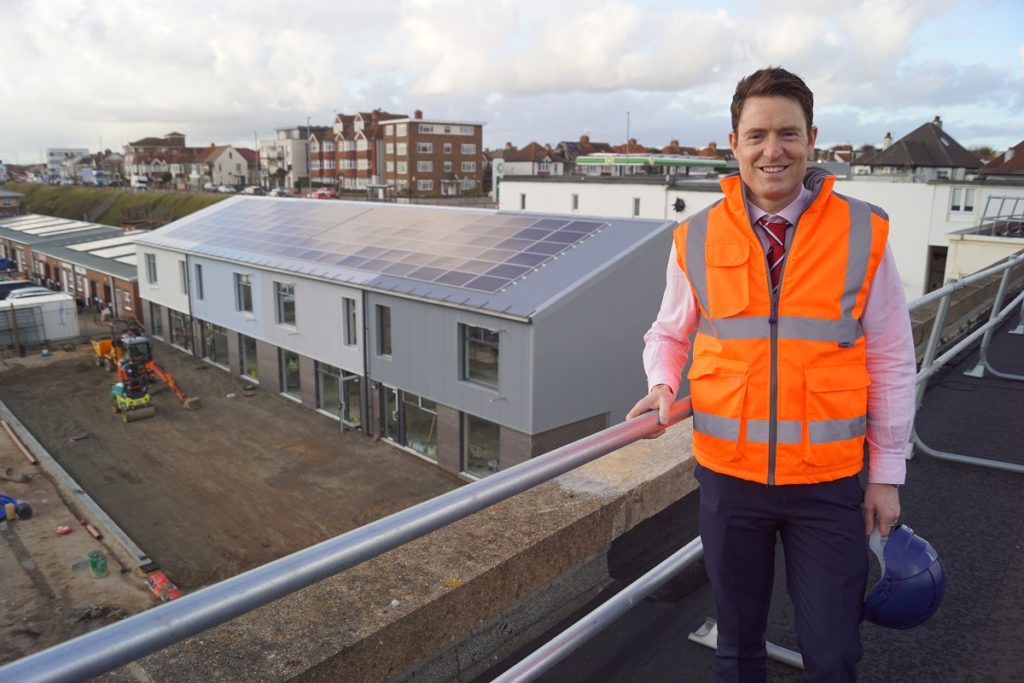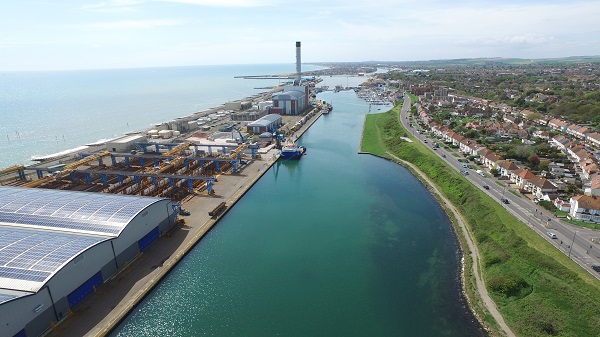What’s your role at Shoreham Port and how is sustainability involved?
My day job is director of property and infrastructure. I look at sustainability across the port as a whole but it is split into two main areas – the running of the port and property development.
What makes Shoreham Port a local leader in sustainability?
Shoreham Port is an EcoPort – we were recertified earlier this year. We’re one of only 15 EcoPorts in the UK, and we were first certified after an environmental review back in 2013. Accreditation is difficult to achieve and involves serious investment in sustainable technology.
It means we’re a member of the EcoPorts network – the main environmental initiative of the European port sector. The aim is to raise awareness about environmental challenges and share knowledge to help each other improve on how we manage our ports sustainably.
What kind of measures has the business taken to make the port more environmentally friendly and cut carbon emissions?
We’re actually the largest solar energy producer in the South East and we have 10,000 solar panels across the port. We also have two onshore wind turbines which produce clean, renewable energy to power our Pump House, with its two huge 185 kilowatt impounding pumps. The pumps are critical to the port as they’re used to replenish water lost to the sea when the lock gates are opened at various times of day and night.
We’ve replaced our operational vehicles with electric vehicles and we have a fleet of electric vans and trucks. Electric vehicle charging points have been installed for colleagues too.
At our Maritime House business centre, we’ve invested half a million pounds in a water source heat pump for central heating and hot water. The office centre is the base for 35 companies with about 150 workers in total and is owned and fully serviced by the port.
The building previously relied upon an oil-burning heating system which was not environmentally friendly. The new pump will save around 70 tonnes of carbon every year – and will stop a similarly damaging amount of air quality emissions from entering the atmosphere. The marine source heat pump works like an air pump, using coils, and is submerged under the water next to the building.
Another project we just launched this year is our sea bins. These are for litter which has come from the land, is blown into the port and ends up floating in the shipping canal. The sea bins float in the water and the rubbish passes through a filter – it’s automatic litter collection powered by solar panels. The sea bins can catch an estimated 3.9 kg of floating debris per day, including micro plastics down to 2mm across.

How does the property development side tie in?
When I came into the job four years ago, I proposed phases of commercial development across the estate to provide much needed versatile commercial units for local SMEs. We’ve completed three developments in the last two years – two in Portslade and one in Southwick.
At the first of the three projects, Lady Bee Enterprise Centre in Southwick, which was finished two years ago, we devised a sustainability template for the buildings. The same template was used for the Hove Enterprise Centre Extension and Ferry Wharf. As an EcoPort, we’re committed to putting sustainability at the forefront of design for each new development, and every new site must follow the template of high sustainability standards.
Our template includes solar panels, 100 per cent LED lighting, air-sourced heat pumps, water-saving measures such as water-efficient white goods and dual flush toilets, plus more than plentiful cycle storage. We have shower facilities for people who want to cycle to work as well as electric vehicle charging points at all units, and we’ve installed large recycling compounds to help people separate waste properly.
Has this meant that tenants care about green growth?
Our commitment to renewable energy and sustainability in our property developments has meant we have attracted a group of tenants with a sustainability focus, including One Green Bottle at Lady Bee, who make reusable steel water bottles that can keep hot or cold for 24 hours. We also have Emotion Microbility selling electric scooters and the Global Wind Energy Council rents a unit as their headquarters.
Do you have any key pieces of advice about sustainable growth in the region?
What we’ve learnt is that your sustainability efforts have to be genuine and they have to be backed up with evidence – with visible and tangible projects.
We’re now attracting companies whose industries are sustainability focused, and therefore they need to think about sustainability in all areas that they operate, including accommodation. Although there’s significant investment involved, biting the bullet and making those investments really does result in growth and economic benefits, as well as hitting your carbon targets earlier than expected.

